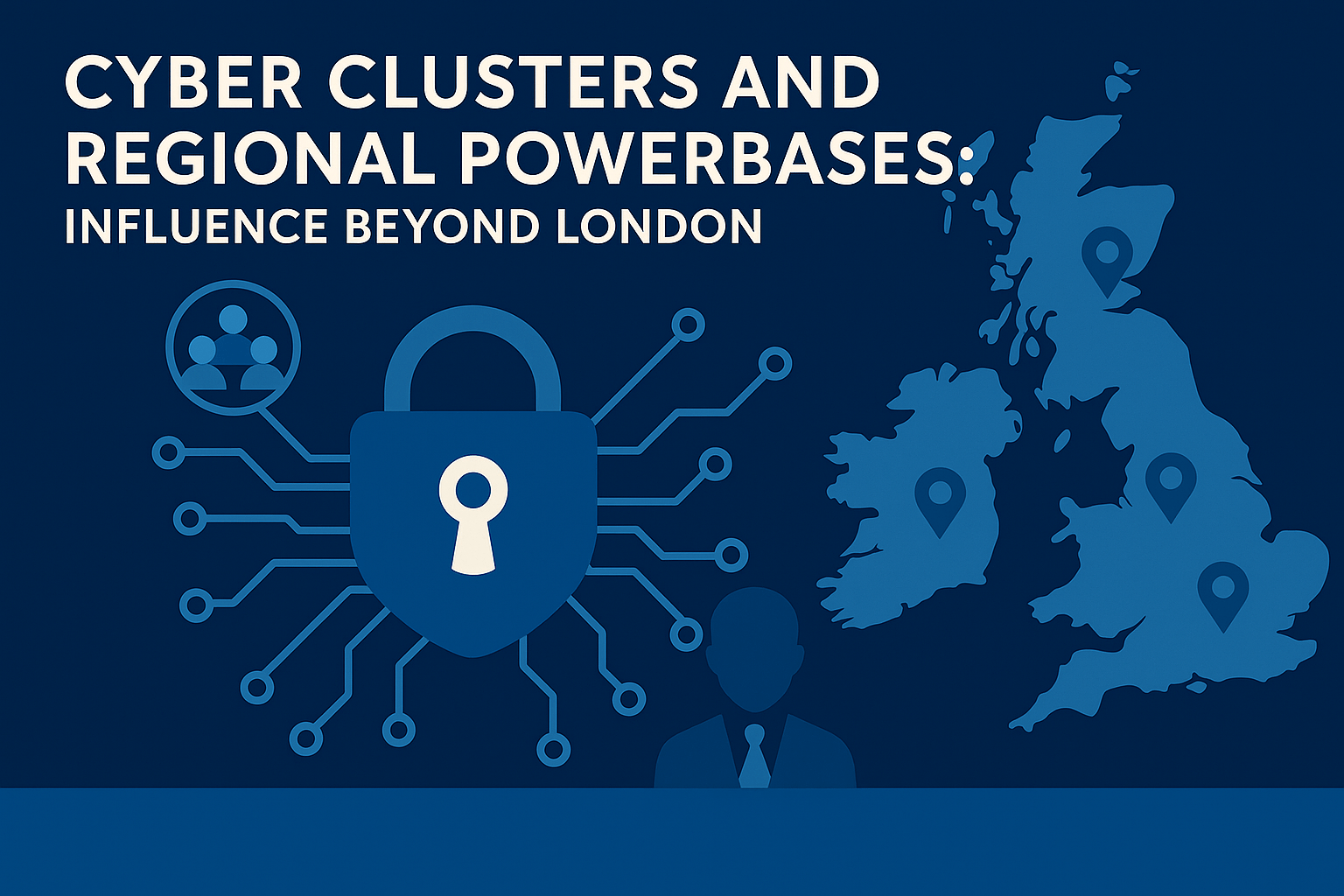From Cheltenham to Belfast, regional ecosystems are quietly shaping the future of UK cybersecurity. When people think of UK cybersecurity, they often picture Whitehall meetings or Canary Wharf boardrooms. But real influence increasingly lies outside London, in regional clusters, civic innovation groups, and place-based partnerships that combine skills, startups, and strategy into powerful local ecosystems. These clusters aren’t just delivering training or running meetups. They are shaping national policy, securing investment, and building sovereign capabilities in collaboration with local government, academia, and industry. This article maps out the regional powerbases transforming the UK’s cybersecurity landscape, and how to engage with them.
Contents
- Contents
- 1. Cheltenham & The Golden Valley (South West)
- 2. West Midlands: Birmingham, Wolverhampton, Coventry
- 3. Scotland: Edinburgh, Glasgow, Dundee
- 4. Northern Ireland: Belfast
- 5. Manchester & the North West
- 6. Wales: Cardiff, Newport, Wrexham
- 7. Yorkshire & the Humber
- 8. Other Regional Movers
- 9. How to Engage With Regional Clusters
- 10. Regional Impact is National Influence
- Final Thoughts
- References
1. Cheltenham & The Golden Valley (South West)
Anchor organisations:
- NCSC / GCHQ (HQ nearby)
- CyNam – Cyber Cheltenham ecosystem convenor
- Golden Valley Development – Cyber innovation campus project
- Hub8 – Innovation space for startups and SMEs
- UWE, University of Gloucestershire – Training and talent development
Why it matters:
Cheltenham is the spiritual capital of UK cybersecurity. Many national programmes (Cyber First, CyberASAP, NCSC for Startups) trace back to partnerships here. Proximity to GCHQ gives unique access to talent, credibility, and threat context.
2. West Midlands: Birmingham, Wolverhampton, Coventry
Anchor organisations:
- Midlands Cyber – Part of the UKC3 cyber cluster network
- West Midlands Cyber Resilience Centre (WMCRC)
- Innovation Alliance for the West Midlands (IAWM)
- TechWM
- WM Cyber Working Group (WM CWG)
- Universities: Warwick, Birmingham, Aston, Wolverhampton
Why it matters:
This is a diverse, growing cyber region with strengths in manufacturing, logistics, and professional services. It also leads the UK in inclusive cyber innovation, including neurodiversity, cyber psychology, and SME-focused resilience.
3. Scotland: Edinburgh, Glasgow, Dundee
Anchor organisations:
- ScotlandIS and ScotlandIS Cyber Cluster
- Abertay University, Napier, Strathclyde – Strong in ethical hacking, OT security, and skills
- The Data Lab / CivTech Scotland – Public-private innovation partnerships
- Cyber Quarter (Abertay + partners) – National centre for applied cyber research
Why it matters:
Scotland combines deep technical talent with policy ambition, driving innovation in OT, AI security, and government digital services.
4. Northern Ireland: Belfast
Anchor organisations:
- CSIT (Centre for Secure Information Technologies) – Queen’s University
- ECIT Institute / InnovateUK projects
- NI Cyber – Active UKC3 cluster
- Invest NI – Strong FDI support
Why it matters:
CSIT is one of the UK’s leading academic-industry cyber hubs, with export-facing companies and secure hardware innovation. It also plays a key role in UK-US cyber R&D relationships.
5. Manchester & the North West
Anchor organisations:
- Manchester Digital – Largest independent digital trade body in the UK
- North West Cyber Security Cluster (UKC3 member)
- University of Manchester / Lancaster University – Security, privacy, and trust
- HOST Salford – Innovation space including cyber labs
Why it matters:
A hotbed of cyber talent, applied research, and city-region collaboration, especially in public sector resilience and advanced manufacturing.
6. Wales: Cardiff, Newport, Wrexham
Anchor organisations:
- Cyber Wales – UKC3-recognised cluster
- Cyber Innovation Hub (Cardiff)
- University of South Wales – Forensics, OT, and public sector engagement
- Women in Cyber Wales – Diversity leader in cyber community-building
Why it matters:
Wales punches above its weight in skills development, diversity, and SME engagement, and is developing as a regional cyber exporter.
7. Yorkshire & the Humber
Anchor organisations:
- Yorkshire Cyber Security Cluster (YCSC)
- Leeds Digital Festival
- University of Leeds / Sheffield / Huddersfield – Cyber, AI, and digital trust
- NHS Digital / Financial Services firms – Key cyber buyers
Why it matters:
Yorkshire offers applied cybersecurity across healthtech, fintech, and education, and is increasingly linked to national pilot schemes.
8. Other Regional Movers
East Midlands – (Nottingham, Leicester, Derby)
- Active East Midlands Cyber Security Cluster
- Strong university base and Midlands Engine links
Kent and Medway, Hampshire and Sussex
- Regional clusters aligned to UKC3, building cyber health, maritime, and 5G security projects
East of England (Cambridge & Norwich)
- Universities + biotech and agri-tech cybersecurity use cases
- Increasing convergence of AI, data ethics, and cyber in academic and commercial work
9. How to Engage With Regional Clusters
- Join a UKC3-recognised cluster, all are open communities
- Speak at regional events, Leeds Digital Festival, Cyber Cheltenham, TechWM, etc.
- Partner on bids, Clusters often co-author Cyber Local, Innovate UK, or Shared Prosperity Fund proposals
- Sponsor skills initiatives, Work with regional CRCs or bootcamp providers to build talent and visibility
- Contribute to working groups, Especially in WM CWG, ScotlandIS, and NI Cyber
10. Regional Impact is National Influence
Many of the UK’s most promising cyber initiatives began in regions:
- Cyber First Girls Competition – Piloted in Cheltenham
- Cyber Runway diversity track – Shaped in Birmingham and Cardiff
- SME resilience frameworks – Tested in Manchester and Wales before national rollout
Policy is often tested regionally and then scaled nationally.
Final Thoughts
Cybersecurity is no longer centralised. The UK’s most innovative, inclusive, and impactful work is happening across the regions, not just in London.
If you’re serious about influence, investment, or innovation in cyber, start with the clusters. Because in UK cyber:
“Regional” doesn’t mean small. It means close to the action.
References
- Inside the UK Cyber Ecosystem: A Strategic Guide in 26 Parts
- The Insider’s Guide to Influencing Senior Tech and Cybersecurity Leaders in the UK
- Cyber Clusters and Regional Powerbases: Influence Beyond London
- UK Cyber Skills Landscape: The Real Gatekeepers of Talent and Training
- From Startups to Scaleups: The UK’s Cyber Commercialisation Ladder, Explained
